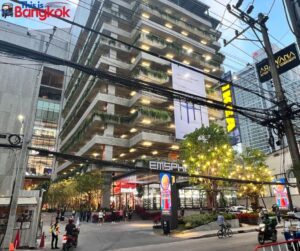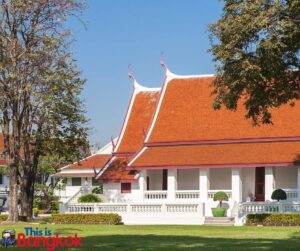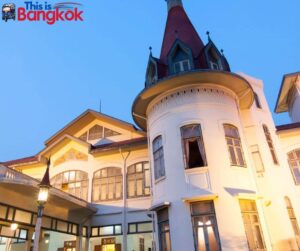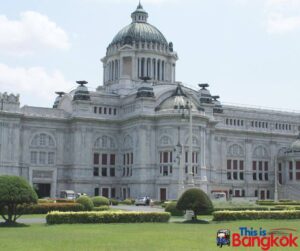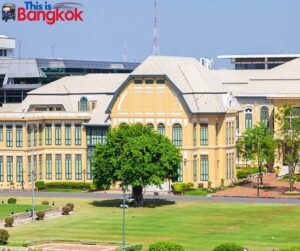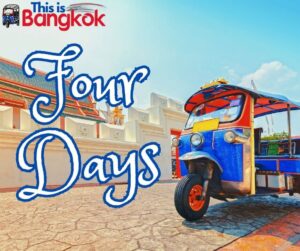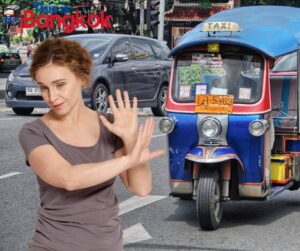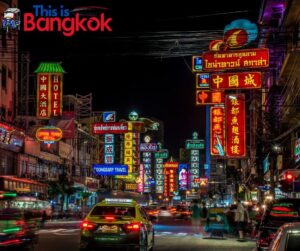Are you seeking an exciting weekend getaway that won’t break your budget? Look no further!
Bangkok is one of the most wallet-friendly vacation destinations around and continues to draw in travelers worldwide.
Despite its low cost of living, Thailand’s vibrant capital offers many attractions, such as stunning temples, fascinating street food, cultural activities, and more – without bankrupting your wallet.
In this blog post, we will explore why Bangkok remains one of the cheapest cities in South East Asia and how it can offer travelers unforgettable experiences at a very affordable price.
So if you’re ready to discover why people are raving about this incredible city, keep reading!
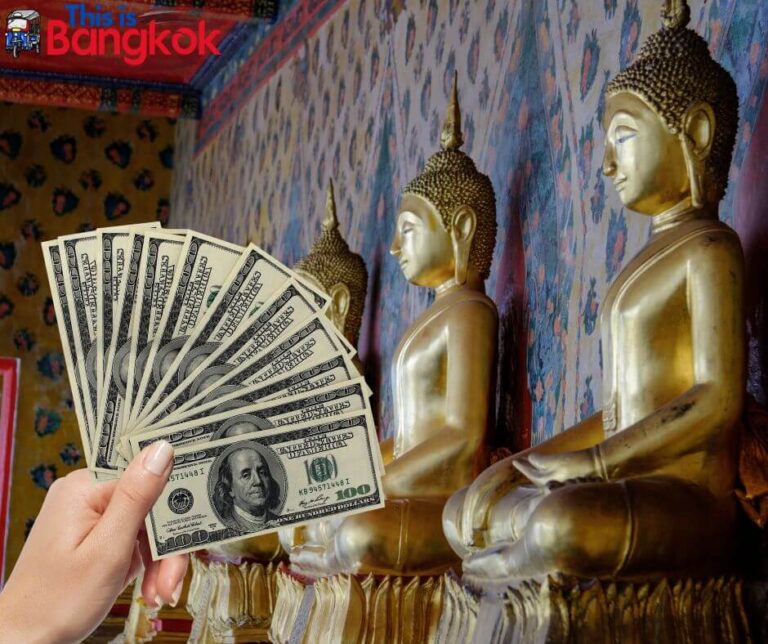
Why is everything in Thailand so cheap?
Bangkok, Thailand, has been known for its relatively low cost of living and affordable prices compared to many other major cities worldwide.
Several factors contribute to Bangkok’s affordability:
Economic Disparities
Thailand is a developing country, and while Bangkok is the capital city and a central economic hub, there are still significant economic disparities within the country. This can lead to lower overall prices for goods and services.
Currency Exchange Rates
The Thai Baht (currency of Thailand) value has historically been weaker compared to major international currencies like the US Dollar or Euro. This can make goods and services in Thailand more affordable for foreigners.
Local Production and Agriculture
Thailand has a robust agricultural sector and produces various food products locally. This can contribute to lower food costs than countries that rely more heavily on imports.
Competition
Bangkok is a bustling city with high competition among businesses. This can lead to lower prices as businesses try to attract customers with competitive pricing.
Tourism
Tourism is a significant industry in Thailand, specifically in Bangkok.
To attract tourists, many services and products are offered at affordable prices, especially when compared to Western countries.
Government Policies
The Thai government has implemented various policies to promote tourism and attract foreign investment.
These policies can indirectly contribute to keeping prices relatively low.
Lower Infrastructure and Operating Costs
The cost of infrastructure and business operations in Bangkok might be lower compared to more developed cities in other countries. This can translate into lower prices for consumers.
Cultural Factors
In Thai culture, there is an emphasis on simplicity and frugality. This cultural mindset can influence the pricing and consumption patterns in the city.
It’s important to note that while Bangkok may be relatively affordable compared to other cities, the cost of living and prices can vary widely depending on individual preferences and lifestyle choices.
Additionally, economic conditions and factors can change over time, so I recommend checking more recent sources for the most up-to-date information on the cost of living in Bangkok.
| Factors Contributing to Bangkok’s Affordability |
|---|
| 1. Economic Disparities: Developing economies and income disparities contribute to lower costs. |
| 2. Currency Exchange Rates: Favorable exchange rates make goods and services cheaper for foreigners. |
| 3. Local Production: Abundant local food and products help keep prices reasonable. |
| 4. Competition: High business competition leads to competitive pricing. |
| 5. Tourism Focus: Tourism drives services, resulting in budget-friendly options. |
| 6. Government Policies: Pro-tourism policies attract foreign visitors and investment. |
| 7. Lower Operating Costs: Lower infrastructure and business operating expenses translate to lower prices. |
| 8. Cultural Emphasis: Thai culture’s simplicity and frugality influence pricing. |
Is Thailand the cheapest country?
Thailand is often considered one of the more affordable destinations for travelers and expatriates, but whether it is the cheapest country depends on various factors and can change over time.
Several countries worldwide are known for their low cost of living and affordability, particularly in Southeast Asia and some parts of South Asia.
These countries include:
- Vietnam: Vietnam is often considered one of the most budget-friendly countries in Southeast Asia, with low costs for accommodation, food, and transportation.
- Cambodia: Cambodia is another Southeast Asian country known for its affordability, especially in cities like Phnom Penh and Siem Reap.
- India: India is known for its diverse culture, rich history, and low cost of living in many areas.
- Indonesia: Indonesia, especially places like Bali, offers a mix of affordability and stunning natural beauty.
- Nepal: Nepal is often cited as one of the least expensive countries to visit, with its beautiful landscapes and cultural attractions.
- Philippines: The Philippines offers a range of budget-friendly options, particularly outside major urban centers.
- Bolivia: In South America, Bolivia is often considered one of the more affordable countries to travel and live in.
It’s important to note that the cost of living can vary significantly within any country, and factors such as location, lifestyle choices, and personal preferences play a significant role in determining expenses.
Additionally, economic conditions can change, affecting the relative affordability of a country over time.
Before making any travel or living decisions, it’s advisable to research current information and consult up-to-date sources to understand the current cost of living and compare it to your budget and requirements.
How cheap is Bangkok, Thailand?
Bangkok, Thailand, is generally considered an affordable destination for travelers and expatriates. However, specific costs can vary widely depending on individual preferences, lifestyle choices, and other factors. Here are some approximate cost ranges for various expenses in Bangkok:
- Accommodation:
- Budget guesthouses or hostels: $10 – $30 USD per night
- Mid-range hotels: $30 – $100 USD per night
- Luxury hotels: $100 USD and above per night
- Food:
- Street food and local eateries: $1 – $5 USD per meal
- Casual dining at restaurants: $5 – $20 USD per meal
- Fine dining: $20 USD and above per meal
- Transportation:
- Public buses and trains: $0.25 – $1 USD per trip
- Taxis (metered): Starting fare of around $1 – $2 USD, with additional charges based on distance
- Motorbike taxis: Starting fare of around $0.50 – $1 USD, with additional charges based on distance
- Ride-sharing services (e.g., Grab): Similar to taxi fares, depending on distance
- Entertainment and Activities:
- Entrance fees to attractions: $1 – $10 USD (varies based on the attraction)
- Movie tickets: $4 – $8 USD
- Nightlife and drinks: $5 – $15 USD for drinks at bars and clubs
- Groceries and Daily Necessities:
- Basic groceries: Prices can vary, but they are generally affordable compared to Western countries
- Healthcare:
- Essential medical consultation: $10 – $30 USD (private clinics)
- Prescription medications: Generally affordable
- Miscellaneous:
- SIM card for mobile phone: $5 – $10 USD
- Clothing and shopping: Prices vary widely based on the type of item and where you shop.
It’s important to remember that these are rough estimates and that costs can vary based on location, time of year, and individual preferences.
Additionally, economic conditions and inflation can lead to price changes over time.
Is Bangkok really that cheap?
Bangkok, Thailand, is generally considered a relatively cheap and affordable destination for tourists and expatriates compared to many other major cities worldwide.
However, it’s important to note that affordability is relative and can vary based on individual perspectives and expectations.
Here are some reasons why Bangkok is often perceived as cheap:
- Accommodation: Bangkok offers various accommodations for different budgets, including budget guesthouses, mid-range hotels, and luxury properties. Even mid-range and luxury options in Bangkok can be more affordable than similar accommodations in other major cities.
- Food: Bangkok is famous for its street food culture, which provides delicious and inexpensive meals. Local eateries and markets offer affordable dining options, allowing travelers to enjoy a variety of dishes without spending much.
- Transportation: Public transportation, including buses and the BTS Skytrain, is relatively affordable. Taxis, tuk-tuks, and ride-sharing services like Grab are also reasonably priced.
- Attractions: Bangkok’s cultural and historical attractions, such as temples and markets, have affordable entrance fees. This allows exploring the city’s rich heritage without breaking the bank.
- Entertainment: From shopping at markets and malls to exploring nightlife options, Bangkok offers a range of entertainment choices that cater to different budgets.
- Services: Services like massages, spa treatments, and beauty treatments are often more affordable in Bangkok compared to Western countries.
- Cost of Living: Overall, the cost of living in Bangkok is lower than in many other global cities, contributing to the perception of affordability.
While Bangkok is often seen as cheap, it’s vital to approach budgeting and spending based on your circumstances and travel preferences.
Prices can also fluctuate over time due to economic factors.
In conclusion
In conclusion, Bangkok, Thailand, is generally considered an affordable city for travelers, offering various cultural, culinary, and entertainment experiences to suit various budget levels.
Its cost of living is relatively low compared to many global cities, making it an attractive destination for both short-term travelers and long-term expatriates.
However, as with any destination, individual costs vary based on personal choices and lifestyle.
It’s essential to research, plan, and budget accordingly to make the most of your Bangkok experience, keeping in mind that economic conditions can change over time.




